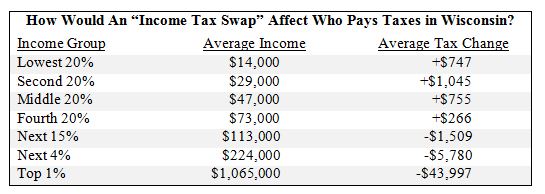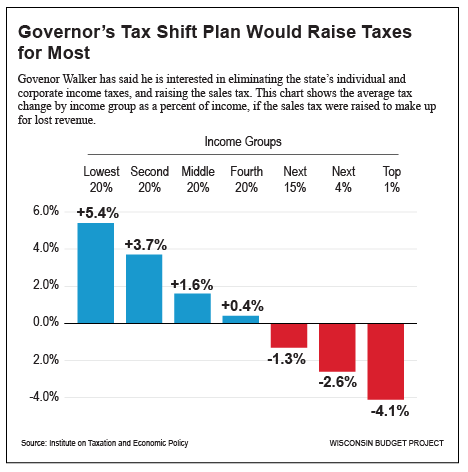Governor Walker’s Tax Shift Plan Would Raise Taxes for Most
Thursday, December 19, 2013 at 2:16 PM by Tamarine Cornelius
 Governor Walker has said he is interested in eliminating the
state’s income tax and raising the sales tax to make up for lost
revenue, a move that would result in a tax increase for all but the
wealthiest taxpayers.
Governor Walker has said he is interested in eliminating the
state’s income tax and raising the sales tax to make up for lost
revenue, a move that would result in a tax increase for all but the
wealthiest taxpayers.To replace the revenue lost by the income tax, the state sales tax rate would need to be raised to 13.5%, giving Wisconsin the highest state sales tax rate in the nation.
The tax shift endorsed by Governor Walker would mean the bottom 80% of taxpayers would be paying more in taxes – some of them, a lot more. For example, a taxpayer in the lowest 20% by income would pay nearly $750 more in taxes, on average. Taxpayers in the top 1% — a group with an average income of $1.1 million – would receive a tax cut averaging nearly $44,000.

The following table shows the average tax change by income group if the individual and corporate income taxes were repealed, and the sales tax was raised to 13.5% to make up for the revenue loss. The analysis assumes that refundable tax credits aimed at helping low-income individuals would not be eliminated – if those credits were eliminated, then the tax increases for those with lower incomes would be even larger than shown in the table below. The analysis was conducted by the Institute for Taxation and Economic Policy.
Measured in percentage terms, taxpayers with the lowest incomes would pay 5.4% more of their income in taxes under the tax shift, as shown in the chart below. Those with the highest incomes would pay 4.1% less of their income in taxes.

There’s a lot we don’t know yet about what the governor plans for the income tax. But one thing is clear: repealing the income tax would mean that all but the wealthiest taxpayers would be paying more in taxes, not less.
Tamarine Cornelius

No comments:
Post a Comment